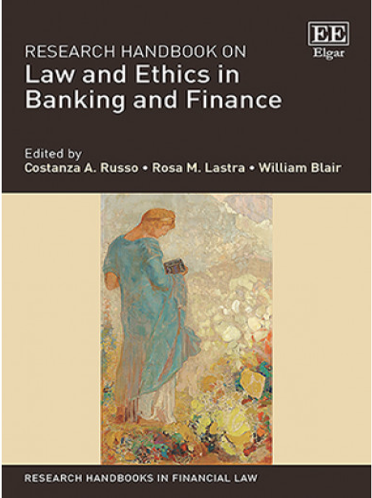Interview with Costanza Russo

Dr. Costanza Russo, an authority on banking law and ethics, has a new book out, The Research Handbook on Law and Ethics in Banking and Finance. Dr. Kara Tan Bhala, the President of Seven Pillars Institute contributed a chapter, “The Philosophical Foundations of Financial Ethics” to the book.
SPI: What is the book about?
CR: The Research Handbook on Law and Ethics in Banking and Finance lays out the relationship between law, regulation, self-regulation, professional standards, and ethics –in banking and finance. The majority of the authors are lawyers, so the book takes a legal approach to the issues being evaluated. The authors who are non-lawyers analyse the relevant issues either from an economic or a philosophical perspective. In addition, the book goes a step further to analyse ethical behaviour and dilemmas that regulatory authorities may face.
The book is divided into 5 parts that cover:
1. The foundation of ethics in finance and banking;
2. The role played by law and standards;
3. Examples on how law can counter unethical behaviour;
4. The effectiveness of regulation and supervisory actions; and
5. Whether financial regulators are ethical.
The book benefits from a foreword by Andrew Bailey, the current Head of the UK Financial Conduct Authority.

SPI: Why is this book important?
CR: Normally ethical studies are the domain of philosophers, organizational behaviour specialists, and business ethics academics. But little is written by lawyers in the specific field of banking and finance. Therefore, the book is an attempt to fill this gap. Besides, the global financial crisis has exposed the need for more ethical behaviour in finance but equally has exposed regulatory weaknesses in detecting unethical behaviour. It is important to look at these issues from a regulatory perspective by focusing on the efficacy, or lack thereof, of regulatory action, which is among the aims of the book.
SPI: Who will find this book helpful?
CR: The authors reflect the target audience of the book, i.e., academics, practitioners, and regulators. Among the contributors are former and current general counsels of central banks, senior judges, philosophers, economists, legal academics, senior partners in law firms, and heads of professional and standards setting bodies.
SPI: Tell us a little about the editors of the book.
CR: The editors are current academics at the Centre of Commercial Law Studies (CCLS) at Queen Mary University of London.
I am a Senior Lecturer in International Banking Law and Business Ethics at CCLS. I also am the Director of both the CCLS Institute for Regulation and Ethics, as well as the CCLS LLM in Banking and Finance in Paris. Recently, I have been working for the Committee on Standards in Public Life (CSPL), a UK Cabinet Office Committee, in conducting a review of the ethics of UK banking and financial regulatory authorities, as part of the CSPL broader review ‘Ethics for Regulators’. I also sat on the steering committee of the UK Banking Standards Board (BSB) for a research project investigating the relationship between law, regulation and ethics in finance. Since 2016, I have been a member of the Banking Union (Resolution) Expert Panel of the ECON Committee of the European Parliament. I have a Master Degree in Law and a PhD in Economics.
William Blair is Professor of Financial Law and Ethics at CCLS. Sir William is a former High Court Judge in England and Wales, and before appointment to the bench practised as a Queen’s Counsel specialising in the law of domestic and international banking and finance. He chairs the Monetary Law Committee of the International Law Association (MOCOMILA) which brings together leading people in the financial law field. He is a judge of the Qatar International Court and an Associate Member arbitrator of 3 Verulam Buildings. He is a Member of the Ethics Committee of Digital Catapult’s AI Machine Intelligence Garage and Chair of the Bank of England’s Enforcement Decision Making Committee. Sir William graduated from Oxford University.
Rosa Lastra holds the Sir John Lubbock Chair in Banking Law at CCLS. She is a member of the Monetary Committee of the International Law Association (MOCOMILA), a founding member of the European Shadow Financial Regulatory Committee (ESFRC), an associate of the Financial Markets Group of the London School of Economics and Political Science, and an affiliated scholar of the Centre for the Study of Central Banks at New York University School of Law. Rosa has served as consultant to the International Monetary Fund, The European Central Bank, the World Bank, the Asian Development Bank, and the Federal Reserve Bank of New York. In 2015 she became a member of the Monetary Expert Panel of the European Parliament. Since 2016 she has been a member of the Banking Union (Resolution) Expert Panel of the European Parliament.
SPI: What in general, are the specialties of the contributors to the book and why should readers care about what they say?
CR: All our contributors take a keen interest in ethics in finance and are leading experts in their fields. In the interest of space I can only give you few examples. I was the first to introduce a module in ethics in finance in a law school at postgraduate level in the UK. Sir William started a research project called the Law and Ethics Research Project that engaged with the creation of the Banking Standards Board in the UK. Members of the Project organized high level round tables at the Bank of England. Rosa recently engaged in the study of the relationship between human rights and justice in financial law. David Rouch was the first to extensively analyse the concept of social license to operate for financial markets. Mark Yallop is the head of the recently set up FICC (fixed income currency and commodities) Market Standards Board, an industry body established by the UK Treasury, the Bank of England, and the Financial Conduct Authority to improve standards in wholesale fixed income, currency, and commodity markets.
SPI: Thank you, Dr. Russo.
